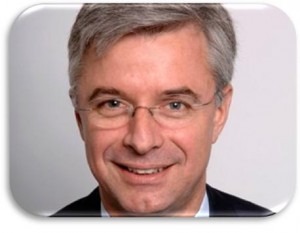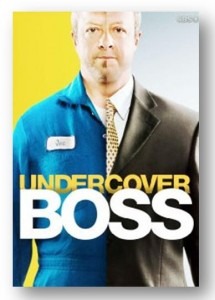 The news that troubled Best Buy has a new CEO who is heralded as a “turnaround specialist” comes as no shock. The company is in a heap of trouble for many reasons – competition from brands like Amazon as well as corporate leadership that has at best been questionable.
The news that troubled Best Buy has a new CEO who is heralded as a “turnaround specialist” comes as no shock. The company is in a heap of trouble for many reasons – competition from brands like Amazon as well as corporate leadership that has at best been questionable.
So Hubert Joly, a French executive, will come to Minneapolis from the global hospitality company, Carlson (also in Minnesota), in the hope of getting Best Buy going again. One of his techniques of turning a company around is unique in this world where corporate CEOs are best known for making the decisions from the corner office.
But before he starts issuing orders on a grand scale, Joly is going to don the blue shirt and hit the floor as a Best Buy salesman. Along the way, he will learn how to interact with customers, work the stock room, handle transactions, and even make house calls with the Geek Squad.
As he told Reuters, “The last time I worked in a store was in 1975. I want to not learn our businesses from the headquarters. I want to learn them from the front line.”
Imagine that – a new CEO who doesn’t have all the answers and wants to experience what it’s really like to work at his new company and serve its customers.
This story took me back to my very first week at Frank N. Magid & Associates, the Marion, Iowa-based media research company that continues to be a leader in its field more than three decades after I spent my time there.
When I entered the ranks of the Magid research team, I had a solid background in audience surveys, having designed and implemented studies for a number of commercial and college broadcasters. But at Magid, we were required to go into the field and actually conduct in-home interviews (that’s how we did them in those days – 45 minute interviews on the front porch with a respondent). In addition, I spent entire days in the coding department, with the secretaries who laid out the studies for print, and even with the keypunchers as we entered data from completed questionnaires.
In short, my bosses at Magid knew that investing time on the front lines was an important part of gaining a 360° understanding of the business and the processes that were required in successfully designing and producing research. And before I wrote my first questionnaire and presented my first study, I had to experience the entire process, wearing the shoes of all the various folks on the team who made it possible.
There are many things I did very early in my career that I have totally forgotten about. But that intensive Magid “boot camp” training is still a vivid memory. It gave me a sense of respect and empathy for what the rest of the company was about – the people who supported the core processes that made Magid an iconic research shop.
 Those same values are what Hubert Joly is seeking to understand at Best Buy – and it’s a process that every station manager, RVP, and CEO should consider learning – or re-learning. The TV show, Undercover Boss, attempted to do that same thing every week as high ranking executives spent time doing entry level tasks.
Those same values are what Hubert Joly is seeking to understand at Best Buy – and it’s a process that every station manager, RVP, and CEO should consider learning – or re-learning. The TV show, Undercover Boss, attempted to do that same thing every week as high ranking executives spent time doing entry level tasks.
Because life inside a radio station has changed radically in just the past few years, spending time with sales people making calls, doing an airshift, and working a promotion or event are the kinds of activities that would bring the operation home to senior executives in a meaningful and significant way.
Hubert Joly has a Herculean task ahead of him, trying to morph and adapt a traditional retail business into a viable consumer electronics service and sales winner. He’s doing this at a time when comparison shopping is being done in real time on mobile devices, often while customers are standing in his own stores. Fighting and adapting to the disruptive winds of change are tough tasks.
Not dissimilar from what’s on every broadcast CEO’s plate right now.
There’s value to being on the front line.
- What To Do If Your Radio Station Goes Through A Midlife Crisis - April 25, 2025
- A 2020 Lesson?It Could All Be Gone In A Flash - April 24, 2025
- How AI Can Give Radio Personalities More…PERSONALITY - April 23, 2025




This is a very interesting comparison. What radio CEO’s need to experience is the backdrop behind all of these positions. The PD who programs four stations has a live airshift and tracks two others. The Production/Imaging/on air person who images 3 stations, does production for 3 more and tracks 2 or 3 shifts. The promotion that’s staffed by a member of the “street team” because the one local personality is on vacation, the sales person who moves and applies money from terrestrial to digital so that digital goals can appear to be met, the DOS who moves the goal posts on sales bonuses days before the bonus period ends, etc.
FWIW – I’m not commenting on how much of this is necessary due to current economics and past mistakes by perpetrators who are long gone. But The CEO’s who came up in one business are now leading a very different one. It would be instructive and helpful if they could get a true taste of what the people on the front lines face every day.
It’s impossible to make good decisions without good information. As there are more and more media competitors than ever and easier access to them all, this kind of input is vital. Radio’s decision makers should not only know, but experience first hand that they are facing unprecedented competition with unprecedented overwork, stress, fear and ever dwindling resources.
It’s one thing to right click on a spreadsheet and become compliant with some predetermined ration in this or that sector. It’s quite another to live with the results of those changes. Both are facts of life. A little more of the latter might create more push back against the former.
Or maybe not…
Bob, I think you hit on a key point – most of today’s broadcast CEOs came up through the ranks in a business that was VERY different than the one that exists today. Regaining the understanding of what it is truly like to work inside a radio station in 2012 might be very helpful in developing a deeper understanding of the challenges their employees face. Thanks for the insights and the comments.
While the late Dickie Rosenfeld was manager at KILT in Houston you might call the station and find Dickie himself answering the phone. Twice a year he had “job swap day” when the office staff took on somebody else’s challenge for the day. Only the airstaff remained in position. I can hear him now in his Goose Creek, Texas, accent: “Get out there, Padnah, and put your hands in the grease.”
Brilliant, and the kind of behavior that obviously resonated with the staff. Thanks for sharing the story, Ed, and for contributing to our blog.